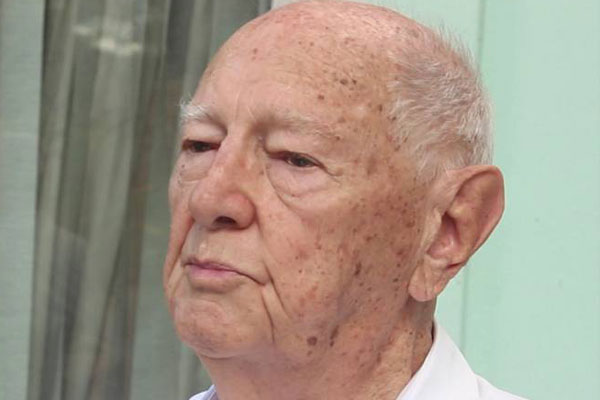
Sometime in 1950, a play See How They Run was staged in the then Umtali (now Mutare).
By Sukuoluhle Ndlovu in Masvingo

One of the actors was a 20-year-old lanky performer who was making his debut in theatre.
After that performance, he did not look back, taking part in other plays like The King and I, Anne Get Your Gun and Oklahoma, which was screened in Beira, My Fair Lady as well as Sound of Music.
Now 90, Doug Hill has lost the youthfulness of the 50s, but his passion for theatre has not ebbed away and he fondly remembers every bit of the action.
“These were big shows and big scenes and we had a great audience from the people. We used to take plays to Bulawayo for five years and we filled the theatre for two nights,” reflected the theatre veteran at his offices in Masvingo last Monday.
“In Mutare, l was involved in acting but l then saw that l was not much of an actor, but was more interested in the production side and that is what l ended up doing.”
In 1960, Hill moved to Fort Victoria (now Masvingo) where his love for theatre blossomed. For 70 years, he championed for the development of theatre and his contribution was so valuable that city mayor, Hubert Fidze last week presented him with the Lifetime of Excellency in Theatre certificate.
- Chamisa under fire over US$120K donation
- Mavhunga puts DeMbare into Chibuku quarterfinals
- Pension funds bet on Cabora Bassa oilfields
- Councils defy govt fire tender directive
Keep Reading
The presentation was done at a highly-subscribed school drama festival which has also been renamed after him. The Masvingo Theatre and Arts Club honoured him for his outstanding work in running theatre in the town.

Reflecting on his long theatrical journey which saw him actively managing theatre in Masvingo for 40 years, Hill — a businessman now enjoying his retirement — said he couldn’t imagine a life away from the stage.
“I have been in theatre for the past 70 years. Ever since I came to Masvingo, l have been doing plays,” he said.
“I am honoured Masvingo Theatre and Arts Club appreciates the work l did and l hope they will continue with the good work. This has been my life since 1960 when l arrived here.”
During that time, Hill captured the hearts of the people of Fort Victoria when he was elected into office as mayor for three terms.
It was while he was mayor that he embarked on something that will define his legacy. Then, plays were done at the town hall but he sensed the construction of the Charles Austin Theatre in 1974, would vastly improve the development of theatre.
“I was the mayor by then and all l did was to pressure the council to build the theatre which is now council property as it is on their land,” he said.
Charles Austin Theatre is the province’s only theatre house and is Zimbabwe’s third largest.
“l did not build the theatre as people might think. l was one of the pioneers who made sure Masvingo had a theatre. I was also honoured as the free man of the city after l left the council and a lot of the early people have since died,” he said.
The theatre guru said he wanted to see theatre progressing, noting that only the younger generation can be entrusted with the challenge to take it to higher levels.
“It is rare to find adults in the theatre watching the plays, but if young people from primary level start now, it can be passed on to the next generations and theatre will be well-recognised in the country,” he said.
Hill believes the School Drama Festival which has been renamed after him can instill the sense of love for theatre among people.
“We had the school festivals for the past 26 years; we had to stop because of certain in-house problems we were facing by then,” he said.
“I worked with a lot of young people in my life and l was anxious to develop theatre from the early ages. So, by having schools festivals, more young people will be engaged and they will pass it on to the next generation and the population involved in theatre will grow.”
The schools festival, renamed Doug Hill High Schools Festival, in honour of him, will now be an annual event.
Due to his advanced age, Hill has since stopped acting, and has left young people to run the Charles Austin Theatre, though he chips in from time to time to help them when they need him.
He, however, does not like staying at home and he checks in his town office near Belmont Press office by 9:30am.
“I come to the office to do odd jobs and l work with my son who helps me too. l am also involved in church activities and l also have a Tuesday study group at my house and help the theatre when they need my help. l am also involved with the Rotary Club,” he said.
Away from theatre, Hill is also known for his role as the district governor of the Rotary Club of Swaziland, Zimbabwe, Malawi, Northern Cape and Pretoria.
He assumed the role when he retired from the council after serving for about 21 years to serve in the Rotary Club, which assisted in the eradication of polio with the help of Unicef and World Health Organiosation.











